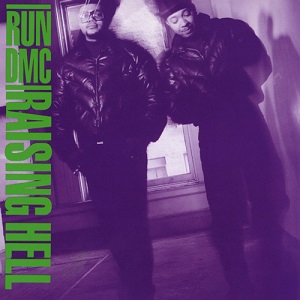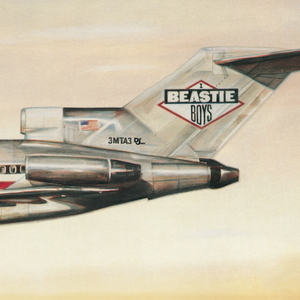Related Research Articles

Beastie Boys were an American hip hop/rap rock group from New York City, formed in 1981. The group was composed of Adam "Ad-Rock" Horovitz, Adam "MCA" Yauch, and Michael "Mike D" Diamond. Beastie Boys were formed out of members of experimental hardcore punk band The Young Aborigines, which was formed in 1979, with Diamond on drums, Jeremy Shatan on bass guitar, John Berry on guitar, and Kate Schellenbach later joining on percussion. When Shatan left New York City in mid-1981, Yauch replaced him on bass and the resulting band was named Beastie Boys. Berry left shortly thereafter and was replaced by Horovitz.
The new school of hip hop was a movement in hip hop music, beginning in 1983–84 with the early records of Run–D.M.C., Whodini, and LL Cool J. Predominantly from Queens and Brooklyn, it was characterized by drum machine-led minimalism, often tinged with elements of rock; rapped taunts, boasts, and socio-political commentary; and aggressive, self-assertive delivery. In song and image, its artists projected a tough, cool, street b-boy attitude. These elements contrasted sharply with funk and disco, novelty hits, live bands, synthesizers, and party rhymes of artists prevalent in the early 1980s. Compared to their older hip hop counterparts, new school artists crafted more cohesive LPs and shorter songs more amenable to airplay. By 1986, their releases began to establish hip hop in the mainstream.

James Todd Smith, known professionally as LL Cool J, is an American rapper, songwriter, record producer, and actor. He is one of the earliest rappers to achieve commercial success, alongside fellow new school hip hop acts Beastie Boys and Run-DMC.

Raising Hell is the third studio album by American hip hop group Run-D.M.C., released on May 15, 1986, by Profile Records. The album was produced by Russell Simmons and Rick Rubin. Raising Hell became the first Platinum and multi-Platinum hip hop record. The album was first certified as Platinum on July 15, 1986, before it was certified as 3× Platinum by the Recording Industry Association of America (RIAA) on April 24, 1987. It is widely considered as one of the most important albums in the history of hip hop music and culture.

Licensed to Ill is the debut studio album by the American hip hop group Beastie Boys. It was released on November 15, 1986, by Def Jam and Columbia Records. The album became the first rap LP to top the Billboard album chart, and was the second rap album to become a platinum album. It is one of Columbia Records' fastest-selling debut records to date and was certified Diamond by the Recording Industry Association of America in 2015 for shipping over ten million copies in the United States. The album received critical acclaim for its unique musical style, chemistry between the group members, and their stylized rapping. Since its release, Licensed to Ill has been ranked by critics as one of the greatest hip hop and debut albums of all time.

Radio is the debut studio album by American rapper LL Cool J. It was released on November 18, 1985, by Def Jam Recordings and Columbia Records. It was also Def Jam's first full-length album release.

Frederick Jay Rubin is an American record executive and record producer. He is a co-founder of Def Jam Recordings, founder of American Recordings, and former co-president of Columbia Records.

Tougher Than Leather is the fourth studio album by American hip hop group Run-D.M.C., released on May 17, 1988, by Profile Records. The album was produced by the group members themselves, Davy D. and Rick Rubin.
André Brown, better known as Doctor Dré, is an American rapper, radio personality and former MTV VJ.

Def Jam Recordings is an American multinational record label owned by Universal Music Group. It is based in Manhattan, New York City, specializing predominantly in hip hop, contemporary R&B, soul and pop.

Lyor Cohen is an American music industry executive and entrepreneur. He has been actively involved in hip hop at various record labels for more than 30 years. He started by managing rappers for Rush Productions, then led Def Jam. After Def Jam, Cohen took on a leadership role at Warner Music Group. In September 2012, Cohen resigned from Warner and started his own independent label, 300 Entertainment. On September 28, 2016, Cohen was named YouTube's Global Head of Music.

Krush Groove is a 1985 American musical comedy-drama film distributed by Warner Bros. Pictures that was written by Ralph Farquhar and directed by Michael Schultz. This film is loosely based on the early days of Def Jam Recordings and up-and-coming record producer Russell Simmons, portrayed by Blair Underwood in his feature film debut. Simmons was the film's co-producer and story consultant; he also had a cameo in the film as a club owner named Crocket.

King of Rock is the second studio album by American hip hop group Run-D.M.C., released on January 21, 1985, by Profile Records. The album was produced by Russell Simmons and Larry Smith. King of Rock became the first rap album to be released on a CD, and was the third rap album to become a platinum album. The album saw the group adopting a more rock-influenced sound, with several tracks prominently featuring heavy guitar riffs. The song "Roots, Rap, Reggae" features Yellowman, and was one of the first hybrids of rap and dancehall.

John Byas, also known as The Original Jazzy Jay or DJ Jazzy Jay, is an American hip hop DJ and producer.
Terrence "Terry" Ronnie Keaton known by the stage name T La Rock, is an American old-school emcee best known for his collaboration with Def Jam Recordings co-founder Rick Rubin and the 1984 single "It's Yours."

"Rock Box" is a song by the American hip hop group Run-DMC. The song was produced by Larry Smith and Russell Simmons and released by Profile Records in March 1984. Following the popularity of their previous two singles "Hard Times" (1983) and "It's Like That" (1983), Profile Records head suggested to the producers and group that they should attempt to record an album as they already had four songs ready, and releasing a few more would not hurt them. Despite speculating low sales from the label and the group not feeling that hip hop was a genre appropriate for a full-length album, they were given an advance to start recording. This led to Run-DMC members Joseph "Run" Simmons and Darryl "DMC" McDaniels going through their rhyme book to develop new songs, one of which would become "Rock Box".

Original Concept was an American 1980s hip-hop group from Long Island, New York, best known for their single "Can You Feel It". They only made one album and it was notable for the absence of lyrics on many of the tracks. The group are perhaps better known for their production prowess and instrumentals.

"Sucker M.C.'s" is a song by American hip hop group Run-D.M.C. It was first released in 1983 as B-side to "It's Like That". The two-sided release marked the start of Run-D.M.C.'s career as their first single, and it is widely regarded as ushering in a new school of hip hop artists with a street image and an abrasive, minimalist sound that marked them out from their predecessors. Both tracks were collected on the trio's self-titled debut album in 1984. WBAU was the first station to play the two songs.

Cey Adams is an American visual artist, graphic designer and author. He was the founding creative director of Def Jam Recordings and is known for his work with Beastie Boys, Public Enemy, LL Cool J, Jay-Z, and Mary J. Blige. He has been described as "legendary" for his work in hip-hop graphic design.

Run-DMC was an American hip hop group from Hollis, Queens New York City, formed in 1983 by Joseph Simmons, Darryl McDaniels, and Jason Mizell. Run-DMC is regarded as one of the most influential acts in the history of hip hop culture and especially one of the most famous hip hop acts of the 1980s. Along with Beastie Boys, LL Cool J, DJ Jazzy Jeff & the Fresh Prince, and Public Enemy, the group pioneered new-school hip hop music and helped usher in the golden age of hip hop. The group was among the first to highlight the importance of the MC and DJ relationship.
References
- 1 2 3 4 5 6 7 8 9 10 11 Said, Amir (November 27, 2017). "John King And The Story Of Chung King Studios". BeatTips.com. Retrieved July 17, 2020.
- 1 2 3 "Chung King Studios". Discogs.com. Retrieved July 19, 2020.
- 1 2 3 4 5 6 7 Thigpen, David E. (2003). Jam Master Jay: The Heart of Hip-Hop. Pocket Star Books. p. 71. ISBN 0-7434-7694-8.
- ↑ Herbert, Conor (September 16, 2019). "The Death of Hip-Hop's Legendary New York City Recording Studios". DJBooth.net. Retrieved July 17, 2020.
- 1 2 3 4 5 6 7 8 9 Weiss, David (February 19, 2015). "Chung King Studios Closes -- New Direction for Classic Rooms at 36 W. 37th Street". SonicScoop.com. Retrieved July 17, 2020.
- 1 2 3 4 5 6 7 8 9 Caprano, Douglas (May 23, 2014). "Chung King Studios, NYC's "Abbey Road" of Hip-Hop". UntappedCities.com. Retrieved July 17, 2020.
- 1 2 3 4 5 "Inside New York City's Legendary Chung King Studios (Fuse News)". 19 July 2013.
- 1 2 3 4 Staff writer(s) (October 12, 1992). "A Guide to the Sites behind the Sounds of New York". New York Magazine. Retrieved July 18, 2020.
- 1 2 3 4 "Letter from Chung King Recording Studios in New York". RecordingConnection.com. Retrieved July 17, 2020.
- 1 2 3 4 Weiss, David (March 1, 2010). "Chung King Exits Longtime Home". MixOnline.com. Retrieved July 17, 2020.
- ↑ Weiss, David (May 14, 2018). "Reservoir: An NYC Studio Takes on a Complex Persona". SonicScoop.com. Retrieved July 17, 2020.